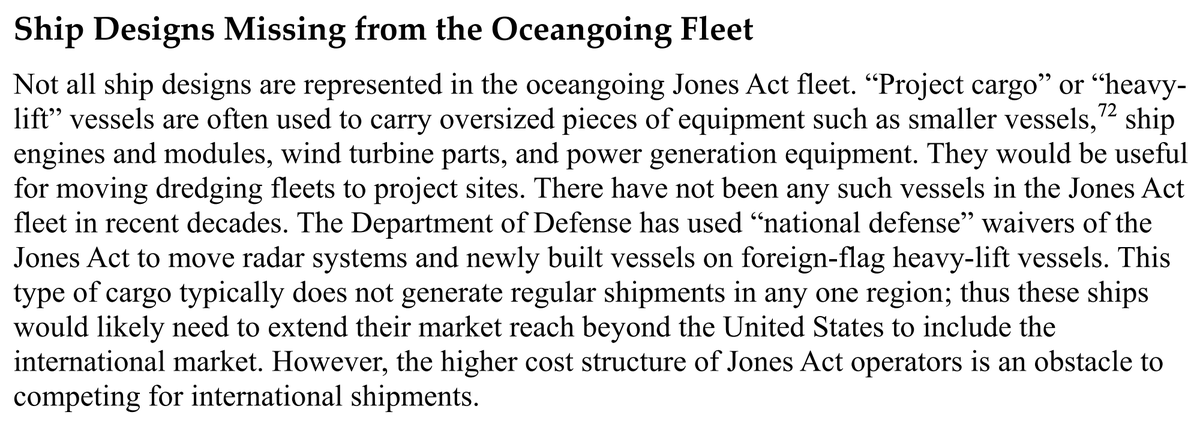
President Biden is currently vacationing in the U.S. Virgin Islands, which is exempt from the Jones Act. Seems like a good time to dig into the USVI's history with this protectionist maritime law.
https://twitter.com/gardnerakayla/status/1607941640563396611
Originally a Danish territory, the United States had made attempts to acquire the Virgin Islands since 1867. But during World War I these efforts took on a new urgency due to fears Germany could conquer Denmark and use the islands as a naval base. 2001-2009.state.gov/r/pa/ho/time/w… 

A treaty to transfer the islands was reached between the U.S. and Denmark on August 4, 1916, ratifications exchanged on January 17, 1917, and formal transfer made on March 31, 1917. In exchange for ceding the islands, the U.S. paid Denmark $25 million. doi.gov/sites/doi.gov/… 

Section 21 of the Merchant Marine Act of 1920 exempted the USVI from U.S. coastwise laws (the Jones Act) but gave the president the ability to impose them. huelladigital.univisionnoticias.com/cruceros-vacac… 

Every year the president would issue a proclamation on whether adequate shipping service to the islands had been established and, if it hadn't, would extend the Jones Act exemption for another year. Here is an example of one such proclamation: presidency.ucsb.edu/documents/proc… 

So while the U.S. Virgin Islands had been granted a Jones Act exemption, the prospect of its application was constantly hanging over their heads. Several contemporaneous studies of the U.S. Virgin Islands warned against applying U.S. coastwise laws to the territory.
A 1924 report from a federal commission tasked with studying the USVI's economy highlighted the downsides of applying these laws and recommended that the USVI's Jones Act exemption be made permanent: drive.google.com/file/d/1MX471O… 





A 1925 report emphasized the harm the Jones Act would cause to the USVI's bunkering business selling coal imported from Virginia. With the JA in place the coal would become more expensive, harming the USVI's ability to compete with neighboring islands. drive.google.com/file/d/1RmfzXi… 

A 1930 report flatly stated that "Perhaps one of the most helpful things that could be done to promote the shipping activities of St. Thomas" would be to make the USVI's Jones Act exemption permanent. drive.google.com/file/d/1o68aW1… 

Also from the report—doesn't get much more direct than this: "We are convinced that the application of the United States coastwise regulations would have a most destructive effect on the trade of the Islands." 

Again highlighting the Jones Act's likely impact on the USVI's coaling business, the report noted this would also be harmful to the U.S. mainland as it would compel the USVI to purchase its coal from non-U.S. sources where the JA does not apply. 

The U.S. Virgin Islands continued to agitate for a permanent Jones Act exemption. In 1932 the USVI's governor testified before Congress noting the lack of investment resulting from the possibility that the JA might be imposed: drive.google.com/file/d/1HVsF2N… 

In 1934 the governor once again appeared before Congress to testify in favor of a permanent exemption, noting the lack of competition that would result if the Jones Act was to be imposed. drive.google.com/file/d/1LvtQsO… 



In 1936 yet another hearing was held on the matter, with the new governor of the USVI again emphasizing the deleterious consequences of applying the Jones Act to the islands: drive.google.com/file/d/1--1mW9… 

Also supportive of an exemption for the USVI at the hearing was Ernest Gruening, director of the Department of Interior's Division of Territories and Island Possessions. 

Gruening would later become governor of Alaska and a critic of the Jones Act's impact on the state: alaska.edu/creatingalaska… 

In June 1936 the Organic Act of the Virgin Islands was signed into law. The president retained the power to apply the Jones Act to the USVI but the legislation did away with the annual proclamation: govinfo.gov/content/pkg/US… 

The territory had succeeded in obtaining at least a semi-permanent exemption from the Jones Act. But in 1976 Sen. J. Bennett Johnston of Louisiana—a traditional bastion of JA support—led a Senate effort to impose the law on the USVI for the transportation of energy products. 





The U.S. Virgin Islands delegate in Congress was strongly opposed, calling the proposed bill "potentially devastating" to the islands' refining industry. drive.google.com/file/d/1J1dC-u… 

The Ford White House performed its own analysis of the legislation, noting the harmful impact the Jones Act's extension would have on East Coast consumers that receive petroleum products from the USVI. Total costs were placed at up to $1 billion: drive.google.com/file/d/1QF-Ucc… 







At a 1979 hearing a U.S. Virgin Islands representative again made clear the negative impact the Jones Act's imposition on energy shipments would have on the territory: drive.google.com/file/d/1rKJuaX… 

Also, this seems relevant:
https://twitter.com/cpgrabow/status/1541776068515872769
Today the U.S. Virgin Islands remains free of the Jones Act, which is widely seen as beneficial to the territory's economy.
https://twitter.com/cpgrabow/status/1494404526136307713
The exemption also benefits the rest of the country. After Hurricane Fiona the exemption allowed the USVI to provide Puerto Rico with fuel supplies using less expensive and more numerous internationally-flagged vessels:
https://twitter.com/cpgrabow/status/1575197525044527104
All of this raises an obvious question: what benefits would neighboring Puerto Rico enjoy today if it had been exempted from the Jones Act? Or for that matter, the rest of the country? Imagine all of the opportunities that are being missed.
/Thread
/Thread
@threadreaderapp please unroll
• • •
Missing some Tweet in this thread? You can try to
force a refresh













